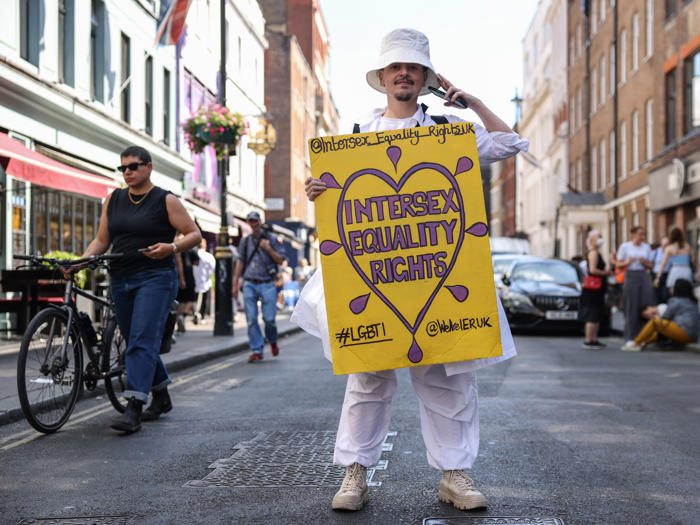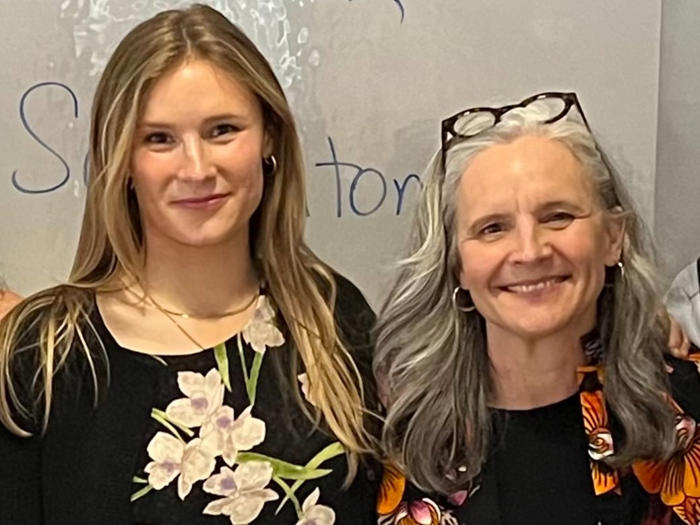‘My consent was never required’: The childhood gender-affirming surgeries Republicans don’t want to ban
Disassociating in the doctor’s office, blinking in the sterile white light, Vera Cowell would often wonder if she was being abducted by aliens.
As a teenager, Cowell never quite understood the reason for these fortnightly injections. Her mother told her that all young people received regular vitamin jabs; that this was simply what her body needed to make her a man.
Cowell didn’t want to be a man, and she hated how the injections – testosterone, she would later surmise – masculinized her body. But nobody seemed to care what she thought.
"My consent was never required," says Cowell, now a 39-year-old therapist in Minnesota, who asked to be referred to by a pseudonym to protect her privacy. "It was simply a matter for adults... nothing had to be explained to me, so they explained nothing."
Cowell’s experience – a vulnerable teenager subjected to unwanted, traumatic medical treatments because doctors and parents decided what gender she should be – resembles the most lurid fantasies of conservative activists and politicians seeking to ban transgender healthcare for under-18s.
Yet because Cowell was born intersex, what happened to her would be explicitly shielded by many of the laws passed to accomplish that goal.
Under the flag of protecting children from "gender ideology", Republicans have given new legal backing to genital surgeries and other procedures on intersex infants and teenagers, often performed long before the patient can possibly consent.
At least 81 per cent of US bills restricting trans healthcare between January 2020 and April 2023 contained exemptions for these highly contentious treatments, according to the Movement Advancement Project, an LGBT+ rights think tank.
A separate count by the intersex advocacy group InterACT found that all 20 such laws passed in 2023 contained similar exemptions.
"It’s just preposterous that these bills discriminate in two ways at the same time," InterACT’s legal and policy director Sylvan Fraser told The Independent.
"The findings they’re citing, and the language they’re using about ‘preventable harm’ – it’s all backwards and incorrect as applied to trans people. But a lot of it is actually true if you apply it to the intersex patient population. It’s tremendously ironic."

Intersex campaigner Valentino Vecchietti at the London Trans Pride protester in July 2022, England, UK (Getty Images)
Some of these procedures – known as intersex medical interventions, or IMIs – are done to treat serious medical emergencies, such as when a child’s genitals form in such a way that stops them passing urine. Those cases are uncontroversial.
In other cases, though, IMIs are designed to align intersex children’s bodies with what is ‘normal’ for the gender chosen for them, which proponents argue will make them happier and healthier in the long run.
Many intersex rights activists disagree. They allege that most early IMIs are unnecessary and dangerous, designed to enforce the gender binary on children who cannot possibly consent. Some refer to the such procedures as "IGM" – that is, intersex genital mutilation.
Some medical and human rights bodies have also questioned or condemned non-emergency IMIs, including the World Health Organization, the American Academy of Pediatrics, the UN Committee Against Torture, and a UN Special Rapporteur on torture.
"[To] the people that are aware of the intersex carve-outs, it’s pretty alarming," says Marissa Adams, a 30-year-old intersex woman and a program coordinator at InterACT, who has suffered lasting physical and psychological damage from genital surgeries in her infancy.
"It is really the first [US] legislation to specifically state that these surgeries are fine, that they’re allowed to happen... they’re ensuring that intersex kids do not have bodily autonomy, while also doing the same for trans youth."
'It’s as if I was simply a specimen under a microscope’
Like many intersex people, Cowell’s medical history was concealed from her in the hope that she would grow up feeling like any other ‘boy’.
As a child, she recalls pain when urinating and frequent medical visits. But she says she was often punished for asking about it, and even shamed for how expensive her treatments were.
Anything from one in two million to one in sixty people are born with some kind of intersex trait, depending on the specific condition (though not everyone accepts the term "intersex"). Their expression and impact varies hugely: some are obvious from birth, some cause life-threatening complications, and some go unnoticed for decades.
Cowell was born with two X chromosomes but ambiguous genitals, caused by a rare genetic condition called de la Chapelle syndrome. Her mother decided to raise her male – "because boys have it easier", Cowell says she once admitted – and medics accordingly constructed a penis, as well as possibly removing uterine tissue (Cowell has no records of exactly what was done).
Since one of her testicles had also been removed, Cowell did not go through a natural male puberty, so her doctors induced one. Clinicians, she alleges, treated her as a curiosity and repeatedly photographed her genitals.
All of this gave Cowell lasting trauma around medical matters. "It was as if I was simply a specimen under a microscope, and the bright lights weren’t to make it easier for me to see, but for them to see me," Cowell says.
Such trauma is all too common. A study in 2020 found that intersex adults in the US had far higher rates of anxiety, depression, and suicide attempts than the average American, while one in four reported living on below $20,000 per year.’’
Another, much larger study in 2019 found that participants who had early genital surgery were more likely to report sexual difficulties and lack of satisfaction. Participants in general were also more likely than endosex (ie, non-intersex) people to undertake gender transition in adulthood.
Justin Tsang, a 28-year-old disability and intersex advocate in Los Angeles who sometimes works with InterACT, and uses both ‘he’ and ‘they’ pronouns, always knew their body was unusual. They had "vivid memories" of being woken up at 3am or 4am as a toddler to be "whisked away into the operating room".

Justin Tsang, who in 2021 took part in a White House roundtable about intersex issues (Justin Tsang)
At age 17, Tsang stumbled across a medical document showing that doctors had comprehensively reconstructed his genitals to fit his parents’ decision to raise him as a boy. “It was purely cosmetic”, he says, adding that it caused him to suffer both physically and emotionally.
Cowell, whose voluntary transition to female as an adult has brought lasting happiness, still sometimes “stays awake at night” wondering how much of her gender identity comes from authentic desire as opposed to trauma.
“The doctors stole from me my ability to even know what I want to be,” she says.
Why some doctors still support childhood surgeries
Since the rise of modern intersex activism in the late 20th century, there have been attempts – mostly unsuccessful – to ban childhood IMIs except where there is a clear, urgent medical need.
Doctors opposing these bills say that there are strong psychological and social rationales for operating early in certain cases, arguing that it helps intersex children to function or pass as a typical boy or girl.
“If I told you we did this clitoroplasty on a 2-year-old, and as a result she never got bullied, and never got humiliated, and didn’t suffer from anxiety and depression, and didn’t kill herself in the ninth or tenth grade – you could say it was purely society that did this to her. And I would say you’re right, but we live in a world where we’re social animals,” said one doctor interviewed for a report by InterACT and Human Rights Watch.
Surgical techniques have also advanced, and it is now common practice to advise that parents be honest with their children about their condition.
“Unfortunately, despite their and the infant parents’ best intentions, there is little to no doubt that some [past] surgeries and decisions had disastrous consequences,” wrote Lane Palmer, a prominent paediatric urologist, in a 2019 op-ed opposing a California IMI ban. “Today, the situation has improved dramatically.”
The question, however, is whether the benefits of early IMIs outweigh the profound ethical and medical risks of refusing to wait until the patient can express their own wishes. On that front, the evidence appears shaky..
“There’s really no convincing research that says anything about heightened risk of psychosocial difficulties from growing up ‘different’ in this context,” says Fraser. “But there is research showing that there are tremendous detrimental effects from living with the results of surgery that you had no say in, and that has such profound personal implications.”
That was also the conclusion of three former US surgeon generals, who wrote in 2017 after reviewing “several dozen studies” that there was “a dearth of persuasive evidence” in favour of early intervention.
Moreover, many intersex people say these procedures increased rather than alleviated their struggles.
“The thing that induces the most shame is actually feeling that your authentic self is not acceptable for some reason,” says Bonnie Scranton, a 53-year-old psychotherapist and parent of an intersex child, whose doctoral dissertation focused on intersex experiences. “It’s not the variation itself, it’s the attempt at erasing or eradicating it.”
Asked how often in his life he has felt ‘normal’, Tsang pauses. “I don’t think I’ve ever felt normal,” he replies. “I think [the surgery] made me feel less normal.”
‘I don’t see my parents as villains’
There is an alternative to all of this. When Scranton’s daughter Ellie Kraus was born in 1997, doctors appeared to mistake her internal testicles for ovaries, and did not remove them.
Only at 14, after Kraus did not start menstruating on schedule, was she diagnosed with complete androgen insensitivity syndrome (CAIS). Although she had XY chromosomes, her body could not process testosterone and instead converted it into estrogen, causing her to grow up looking typically female.
After her diagnosis, her doctor recommended she have her testes out due to cancer risk. But meeting other intersex people and activists gave her the confidence and knowledge to push back with an alternative, non-surgical treatment plan.
“It was certainly not a positive reaction,” recalls Kraus, now a 26-year-old science teacher in Brooklyn, New York who says her gender identity is simply ‘intersex’. “I think my provider... saw himself as the person who was in charge in the room. It was an intimidating moment.”

Ellie Kraus, left, with her mother Bonnie Scranton (Ellie Kraus and Bonnie Scranton)
Kraus would ultimately have her testes removed as an adult, but being the one to decide made all the difference. Although this is not possible for all people with CAIS, she was able to finish puberty without medical help, and had agency over the process.
Rosalind, 38, in Pennsylvania, is attempting a similar path with her two-year-old son James (both names are pseudonyms). Save one procedure to descend his testicles, she has refused further surgeries.
The last straw came when a specialist told her not to worry because a certain surgery was reversible. “What he meant was that it’s surgically reversible,” Rosalind says. “But anyone who’s put their child into surgery knows that it’s not easy. It always comes with risks… and in this instance it could also come with very severe consequences down the road.”
Rosalind’s plan now is to raise James to love his body, and support him if he ever chooses to change it. For health insurance reasons she felt compelled to pick a gender, but she is prepared for the possibility that he’ll change that too.
Many people interviewed for this piece said their parents felt pressured or rushed by doctors and lacked information. “I don’t see my parents as villains. I often say they were just as much victims as I was,” says one anonymous intersex person who received early surgery.
What Fraser advocates is that the same international medical standards commonly applied to trans children also apply to intersex children. In other words, full informed consent for every procedure, unless in a genuine emergency.
“It is so much less common for trans people to regret accessing gender-affirming care, because they have to work so hard to access that care,” they say.
“But with intersex people it’s just the opposite; they’re being pushed downhill while a trans person is having to climb uphill.”
Independent readers are independently-minded global citizens. They are not defined by traditional demographics or profiles, but by their attitudes. In today’s increasingly fragmented world, communities value real facts and frank opinions delivered first-hand from a non-biased news brand that they can trust. Armed with information and inspiration, Independent readers are empowered and equipped to take a stand for the things they believe in.
